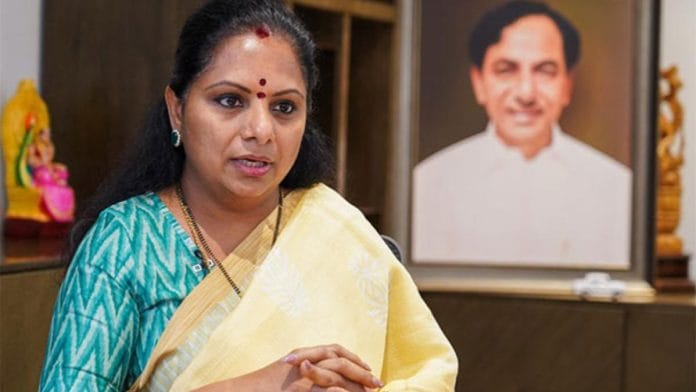Thank you dear subscribers, we are overwhelmed with your response.
Your Turn is a unique section from ThePrint featuring points of view from its subscribers. If you are a subscriber, have a point of view, please send it to us. If not, do subscribe here: https://theprint.in/subscribe/
The suspension of K. Kavitha, daughter of former Telangana Chief Minister K. Chandrashekar Rao, from the Bharat Rashtra Samithi (BRS) has generated predictable headlines. Family feuds, factional rivalries, and “anti-party activities” are hardly unusual in Indian politics. But if we pause for a moment, this episode offers a window into something deeper: the urgent need to reform how political parties function in India.
For decades, analysts have pointed out that political parties here are less like institutions and more like private firms — tightly held, dynastic, and resistant to change. In his book India Grows at Night: A Liberal Case for a Strong State, author Gurcharan Das described this as “amoral familism”: a culture where loyalty to family and kin outweighs loyalty to principle or institution. In India, parties routinely function as hereditary enterprises. Nehru’s Congress was followed by Indira Gandhi’s dynastic turn; regional parties from DMK in Tamil Nadu to RJD in Bihar to Shiv Sena in Maharashtra have all walked the same path. Kinship, not competence, decides succession.
This matters because political parties are the very heart of our democracy. They are too central to public life to function as private fiefdoms. When they do, institutions erode. Legislators stop acting as representatives of the people and become loyalists of the leadership. MPs and MLAs are treated as party men first, policymakers later — if at all.
Contrast this with the UK, from where we borrowed our Westminster parliamentary model. While we imported the structure of government, we neglected to import the democratic culture within political parties themselves. In Britain, leaders rise and fall not only by public mandate, but also by the confidence of their own MPs. David Cameron stepped down after the Brexit referendum, Theresa May after failing to push her deal through Parliament, and Boris Johnson after serial scandals eroded trust. Even Liz Truss lasted just 44 days before her party judged her a liability. Rishi Sunak, though celebrated in India for his heritage, rose to power because a robust system of internal party democracy made space for accountability.
Ask yourself: can you imagine an Indian party supremo being removed by their own legislators for the sake of public good? Would an Indian MP stand up against their leader on principle, as Geoffrey Howe once did against Thatcher? The very question feels absurd, and that is the tragedy of our democracy.
Why this difference? In India, leaders after independence assumed democracy would flourish organically, without the need for institutionalised rules to govern parties. The legacy of towering freedom fighters gave way to parties run like private estates. Over time, this hollowed out the role of MPs and MLAs, who became agents of party leadership rather than independent legislators accountable to citizens.
The result is a system where leaders are unchallenged, dissent is punished, and succession is opaque. Citizens may vote, but the critical democratic contest — within parties — rarely exists.
Reform is possible, and examples from other democracies show the way. Germany, for instance, has legal frameworks that compel parties to maintain accountability and transparency. India needs similar measures:
- Transparent leadership elections: Mandating elections for leadership positions at all levels of parties is essential to curb hereditary control and foster genuine representation.
- Funding transparency: Clear laws on political donations, ending secrecy in party financing, would strengthen democratic integrity.
- Decentralisation of power: Empowering local governance and nurturing grassroots leaders would democratise parties from below and expand the talent pool.
Reforming our parties is not an abstract institutionalist demand. It has direct consequences for governance. When MPs are reduced to followers, they cannot check executive overreach. When parties close themselves to internal debate, policy is decided by narrow circles, not collective deliberation. When dynasties monopolise leadership, young talent is stifled and citizens are left with fewer genuine choices.
Kavitha’s suspension will, like many such episodes, soon be overtaken by the next news cycle. But if we pay attention, it highlights a larger truth: as long as parties are run as private fiefdoms, Indian democracy will remain incomplete. Reform must begin not in Parliament, but inside the parties that feed it.
Until then, episodes like this will remain not just family dramas, but reminders of how much India still needs to do to make its democracy whole.
Sai Manikanta Thota is an ex scholar at Indian School of Public Policy
These pieces are being published as they have been received – they have not been edited/fact-checked by ThePrint.


